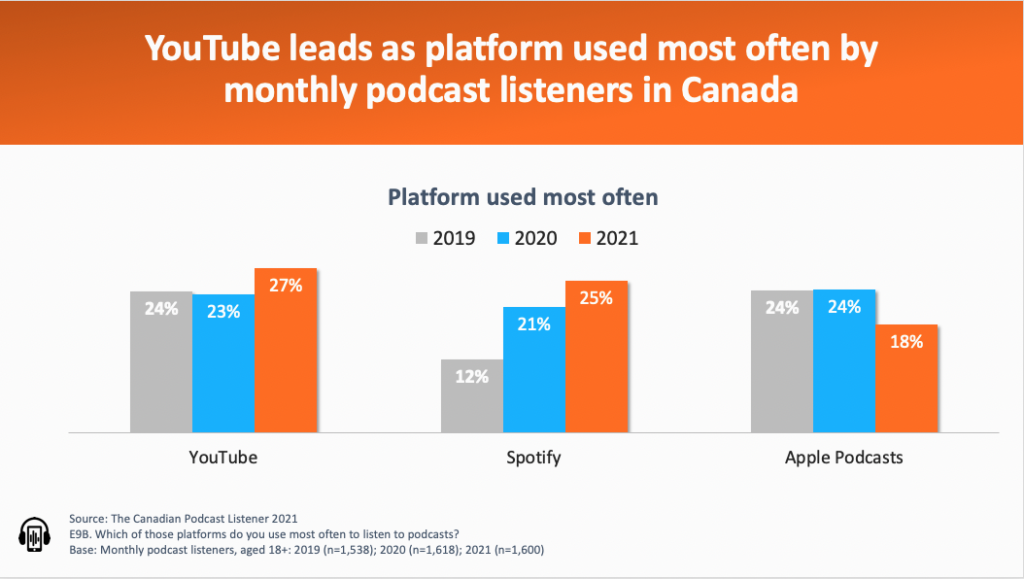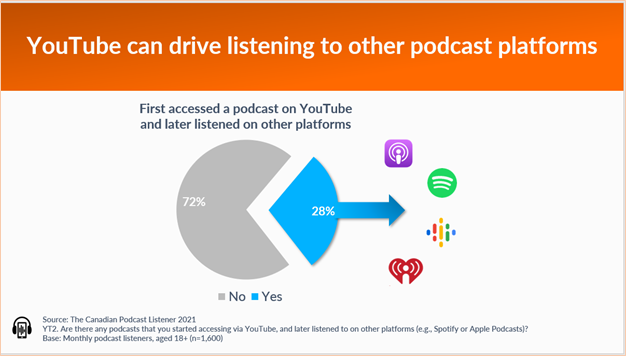It’s an uncomfortable truth for podcasters and publishers who have built their business on downloads. But it doesn’t make it any less true. A lot of podcast listeners go to YouTube for podcasts. As a podcaster, you can choose to ignore that reality or embrace it. Wishing it away isn’t a workable option.
We’ve been watching this for a few years now, and in our just-released The Canadian Podcast Listener 2021 study, we see even more evidence that access to podcasts via YouTube is here to stay. More than one-in-four monthly podcast listeners (27%) name YouTube as the platform they use most often. That’s up 4 points over last year even as Joe Rogan left YouTube for his $100 million exclusivity deal with Spotify. And we’re not just talking Canada. YouTube has also established itself as one of the Big 3 podcast platforms among weekly podcast listeners in the US, based on the Fall 2021 Podcast Download Study we just worked on with CUMULUS Media.

Listeners often get their podcasts from YouTube for podcasts because it’s their go-to source for all kinds of content. YouTube has gone way beyond cat videos over the last 15 years. It has long served as an on-demand option to stream music, to watch movies and even to get the news—according to a 2020 Pew Research Center study, 26% of American adults use YouTube for news. So it should come as no surprise that it’s also a first stop for many podcast listeners.
This spells an opportunity for podcasters to not only get comfortable with YouTube but profit from it. And yes, that includes a chance to increase your downloads. More than a quarter (28%) of all monthly podcast listeners in this year’s Canadian Podcast Listener study said they first accessed a podcast on YouTube that they then listened to on another platform. That makes YouTube a potential gateway to new downloads and new listeners.

YouTube is, however, a means to an end, not the end itself. Podcasters should use their YouTube presence to feed their strategy, not to be their strategy.
YouTube is best used as a tactical tool to attract new listeners to a podcast and then direct them to Apple Podcasts, Spotify and the other platforms where they can download the podcast. It’s only then that YouTube will fit squarely into your business model. Downloads, not YouTube views, are the trading currency used to buy and sell podcasts. You get more revenue per listener from downloads than YouTube views. And you can’t add YouTube views to your podcast downloads. It’s adding apples to oranges and advertisers aren’t interested.
Finally, YouTube is a different kind of listening experience where listener retention can be challenging. The ad experience is also less than ideal. Most of the listeners in this year’s Canadian Podcast Listener who use both YouTube and other podcast platforms say they are more likely to skip ads on the podcasts they access on YouTube.
How can you use YouTube as a funnel to draw listeners to other podcast platforms? It’s time for experimentation. You can feature highlights from your podcast on YouTube as a sample of the full-length version available for download on a podcast app. That’s the approach that Joe Rogan is currently using to tease the full-length version on Spotify. You can also test different visuals and showcasing different slices of content to see what drives conversion and engagement. But every podcast is different and not everyone is Joe Rogan. It depends on your goals, and it depends on your podcast. A podcast built around conversation like Rogan or Conan O’Brien offers distinct opportunities from a podcast like This American Life that’s built around a narrative.
Meanwhile, keep a close eye on YouTube and its plans for podcasts. They’ve clearly picked up on their growing footprint in podcasts and have something in mind. In September, YouTube launched their first-ever podcast, The Upload: The Rise of the Creator Economy (Yes, it’s ‘available wherever you get podcasts,’ including YouTube.) In October, they hired an executive to “oversee its podcasting experience.” The speculation has been that the next step will be a revamp of Google Podcasts with YouTube at its core.
One safe prediction for the new year: Whether it’s the elephant in the room or an 8,000-pound gorilla, YouTube and what it means for podcasting will be one of the big topics for conversation in 2022.
The Canadian Podcast Listener 2021 is co-published by Signal Hill Insights and Jeff Ulster, with support from The Podcast Exchange (TPX). Results are based on online surveys using a market representative sample of more than 4,500 Canadian adults from Maru Voice Canada.
